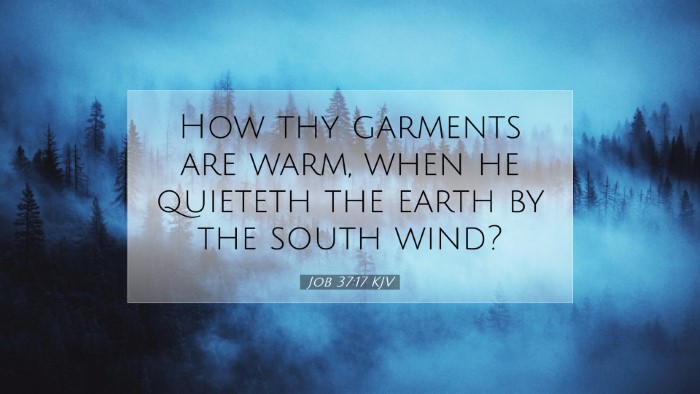Old Testament
Genesis Exodus Leviticus Numbers Deuteronomy Joshua Judges Ruth 1 Samuel 2 Samuel 1 Kings 2 Kings 1 Chronicles 2 Chronicles Ezra Nehemiah Esther Job Psalms Proverbs Ecclesiastes Song of Solomon Isaiah Jeremiah Lamentations Ezekiel Daniel Hosea Joel Amos Obadiah Jonah Micah Nahum Habakkuk Zephaniah Haggai Zechariah MalachiJob 37:17
Job 37:17 KJV
How thy garments are warm, when he quieteth the earth by the south wind?
Job 37:17 Bible Commentary
Commentary on Job 37:17
Verse Overview: Job 37:17 presents a powerful observation about the natural phenomena and the intricate workings of God in the world. The verse reads: "How thy garments are warm, when he quieteth the earth by the south wind!" This verse is part of a larger discourse by Elihu, underscoring the majesty of God in creation.
Theological Significance
The verse serves as an illustration of God's control over the natural world. Matthew Henry notes that it is a reminder of God's providence as He causes the weather patterns that evoke both wonder and fear in humanity.
Albert Barnes emphasizes the importance of recognizing God's hand in the phenomena around us. The “south wind” symbolizes favorable conditions, suggesting God's power to bring comfort and warmth amidst turmoil.
Adam Clarke expands on this by reminding us that the south wind is often associated with warmth and calm, highlighting God's grace during distressing circumstances.
Interpretation of Key Themes
- Creation and Providence:
The verse is an acknowledgment of God's sovereignty over the natural world. The warmth of the garments signifies God’s provision for humanity, reflecting His care for His creation.
- Human Response:
This passage challenges individuals to respond to the wonders of creation with humility and awe. Henry notes that the atmospheric conditions prompt us to reflect on the greatness of the Creator.
- Divine Communication:
The south wind is more than just a meteorological event; it symbolizes God's way of communicating His will and purpose. Elihu’s speech compels Job—and us—to perceive God’s voice in the elements.
Application for Today’s Believers
This verse invites contemporary believers to consider how often they overlook God’s handiwork in the world around them. It urges pastors and theologians to incorporate the wonder of creation in their teachings, encouraging congregations to see God’s presence in the everyday realities of life.
Henry affirms that recognizing the warmth of the southern breeze can lead to spiritual warmth, a metaphor for the Holy Spirit's work in our hearts. Clarke adds that believers should see the providential hand of God in seemingly routine events and respond in faith and gratitude.
Response to Natural Phenomena
The strong winds and weather changes throughout the book of Job symbolize trials and tribulations. In Job 37:17, Elihu directs Job’s attention to the gentler aspects of nature to shift his perspective from suffering to contemplation of God's goodness.
Barnes suggests that the response to the elements of nature should be one of reverence; the calming south wind illustrates God's capacity to bring peace. Therefore, in times of distress, believers are encouraged to trust in God, who can quiet the storms within and around them.
Conclusion
In conclusion, Job 37:17 serves as a profound reminder of God’s omnipotence and benevolence in creation. It challenges believers to acknowledge God’s presence in the natural world and to recognize that He is always at work, providing for and guiding His people.
This insight into the character of God invites deeper reflection and understanding for pastors, students, and scholars, encouraging them to see the intricacies of God's design in life’s trials and the beauty that emerges from God’s providential care.


